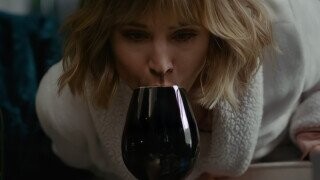Unpacking The Weirdness Of The 'Woman in the House' Twist

The Woman in the House is a strange show—and no, that's not because we missed the joke. Note: For convenience's sake, we will be referring to the show by its original title, The Woman in the House, rather than its final title. That final title, The Woman in the House Across the Street from the Girl in the Window, promises more wackiness than the show ever had ready.
Netflix's The Woman in the House is a parody of mystery stories. Specifically, it's a parody of suburban gothic stories, a subgenre "for women, by women," invariably about a troubled woman who gets caught up in a murder.
Don't Miss
A parody TV show can take a few different routes. Maybe it'll aim for constant absurdity. You won't go 10 seconds without a joke. It'll exaggerate tropes of course, but also every scene will have gags going on the background, characters will have silly names, dialogue will feature puns that no one in the scene seems to notice. Something like the show Angie Tribeca:
Or maybe it'll be like American Vandal, where the characters behave realistically but the comedy comes from transplanting the beats associated with the genre to something incongruous. Or maybe it'll be a direct parody of a single famous story, making fun of it scene by scene. Or maybe it will create an original plot but will elaborately recreate scenes from various famous stories, so the fun comes from spotting all the references.
The Woman in the House doesn't take any of those routes. Instead, it puts together its own plot by using many of the clichés of the genre but generally without really playing with any of them. Then, every so often, it will funnily exaggerate some trope (say, some bit of narration goes on too long, or a sex scene jumps between too many locations). And when we say "every so often," we mean "not that often, actually," leaving long stretches of every episode without any parody.
A typical non-parody mystery comedy, like Only Murders in the Building or Kristen Bell's own Veronica Mars, has more jokes per episode than The Woman in the House. Which makes it sound like just a very subtle spoof, sure, but that makes for a strange viewing experience because its actual gags aren't subtle.
Below is a random clip we pulled, one without the obvious gags. It's overwrought and rushed but not more so than a bad movie. It also has some humor, but serious mysteries have some humor too. Are we missing the joke (other than "this is so what these sorts of mysteries do")? Are a lot of people watching this laughing, or saying, "Wow, that's a clever observation," or just saying, “This is a good scene"?
Finally, since this is a mystery, comes the reveal. This is where parodies most clearly distinguish themselves from the genre they're mocking. A parody generally has to do a twist on the traditional concept of the twist itself. Maybe it'll break the fourth wall and have the writer or director walk on-set. Or it'll turn into a crossover with another property. Or the characters will reveal the whole thing was a prank or a reality TV show. A smarter ending might follow all the rules of reality, but if this is a parody, it'd still better manage to be pretty over-the-top (say, like the big ending to Clue).
Here's the twist ending to The Woman in the House: The kid did it. Meaning, the little girl in the above clip (okay, we lied, we didn't pick the clip totally randomly). Which is an exaggerated ending, we guess, in that the little girl probably couldn't physically do some of the stuff the show has her doing. But this is hardly new ground for the genre. We can think of a couple different recent high-profile mysteries where the kid did it, not to mention one Agatha Christie book from many decades ago where the murderer was a little girl. On the other hand, the show doesn't seem to be picking the little girl because it's a cliché. They don't call it out as a cliché, and they present it as surprise.
Kirsten Bell's character and the girl fight, and this part is exaggerated ... but only a little. Like, it's not a realistic fight, but if you're expecting some Scary Movie–level physicality, you're going to be disappointed.
We don't want to dunk on this show too hard. It didn't do anything aggressively wrong. We guess, though, that it's tough to do a parody when every story nowadays is already so self-aware.
Want to get all of this week's twist articles packaged together in one shot, so you don't miss a thing? Subscribe to the weekly Saturday Morning Cracked newsletter:
